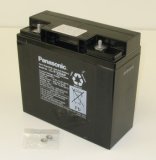lead-acid battery maintenance
The quickest way to ruin lead-acid batteries is to discharge them deeply and leave them stand 'dead' for an extended period of time. When they discharge, there is a chemical change in the positive plates of the battery. They change from lead oxide when charged to lead sulfate when discharged. If they remain in the lead sulfate state for a few days, some part of the plate does not return to lead oxide when the battery is recharged. If the battery remains discharged longer, a greater amount of the positive plate will remain lead sulfate. The parts of the plates that become "sulfated" no longer store energy. Batteries that are deeply discharged, and then charged partially on a regular basis can fail in less than one year.
 |
Check your batteries on a regular basis to be sure they are getting charged. Use a hydrometer to check the specific gravity of your lead acid batteries. If batteries are cycled very deeply and then recharged quickly, the specific gravity reading will be lower than it should because the electrolyte at the top of the battery may not have mixed with the "charged" electrolyte. Check the electrolyte level in wet-cell batteries at least four times a year and top each cell off with distilled water. Do not add water to discharged batteries. Electrolyte is absorbed when batteries are very discharged. If you add water at this time, and then recharge the battery, electrolyte will overflow and make a mess.
Keep the tops of your batteries clean and check that cables are tight. Do
not tighten or remove cables while charging or discharging. Any spark around
batteries can cause a hydrogen explosion inside, and ruin one of the cells,
and you.
It is a good idea to do an equalizing charge when some cells show a variation
of 0.05 specific gravity from each other. This is a long steady overcharge,
bringing the battery to a gassing or bubbling state. Do not equalize sealed
or gel type batteries.
With proper care, lead-acid batteries will have a long service life and work very well in almost any power system. Unfortunately, with poor treatment lead-acid battery life will be very short.
Safety precautions
Always use extreme caution when handling lead-acid batteries and electrolyte. Wear gloves, goggles and old clothes. The sulfuric acid in lead-acid batteries will burn skin and eyes and destroy cotton and wool clothing. Adopt these specific measures for maximum safety:
1. Someone should be within range of your voice to come to your aid when you work near batteries
2. Have plenty of fresh water and soap nearby in case battery acid contact skin, clothing, or eyes
3. Wear complete eye protection and clothing protection. Avoid touching eyes while working near batteries. Wash your hands when done
4. If acid contacts skin or clothing, wash immediately with soap and water. If acid enters eyes, immediately flood eyes with running cool water for at least 15 minutes and get medical attention immediately
5. Baking soda neutralizes lead acid battery electrolyte. Vinegar neutralizes spilled NiCad and NiFe battery electrolyte. Keep a supply on hand in the area of the batteries
6. NEVER smoke or allow a spark or flame in vicinity of a battery or generator
7. Be extra cautious when working with metal tools on, and around batteries. Potential exists to short-circuit the batteries or other electrical parts which may result in a spark which could cause an explosion
8. Remove personal metal items such as rings, bracelets, necklaces, and watches when working with a battery. A battery can produce a short-circuit current high enough to weld a ring, or the like, to metal causing severe burns
9. If a remote or automatic generator start system is used, disable the automatic starting circuit and/or disconnect the generator from its starting battery while servicing to prevent accidental starting during servicing
